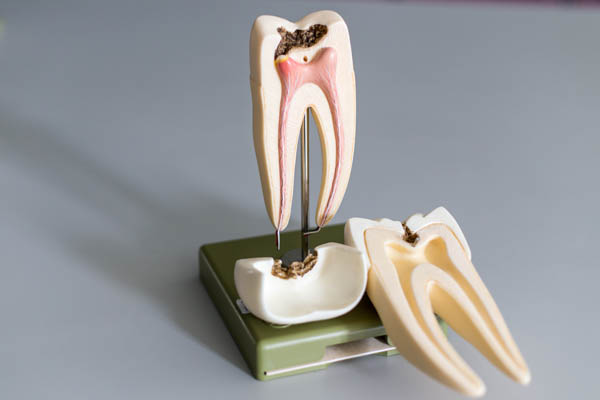The Risks of Delaying Root Canal Therapy

Have you been told by your dentist that you need a root canal? Read on to learn about the importance of getting this treatment in a timely manner. There is no good reason to delay getting a root canal. Still, many people end up doing just that due to reasons like a fear of dentists or of getting dental treatments. The thing is, there is no getting around a tooth that needs a root canal. The damage or infection will not go away on its own, and the pain it causes will only intensify over time.
Wait long enough, and the dentist might not be able to save the tooth with root canal therapy. An extraction might be needed due to the infection spreading and threatening to get into other parts of the body, which can be life-threatening.
Saving teeth with root canal therapy
One of the most common reasons people avoid getting the dental treatments they need is a fear of dentists. People with such fears typically avoid getting routine preventative treatments and restorative procedures they need until the discomfort and pain caused by their issue is too intense to be ignored.
Root canals are often recommended when a tooth is severely damaged or decayed. They are also used to treat active infections. The treatment involves removing soft tissues in the pulp chamber of the tooth, which gets rid of any bacteria.
The pulp chamber is the innermost layer of a tooth, and it holds the tooth’s nerves, blood vessels, and connective tissues. It is sealed off from the rest of the tooth, so irritants in the mouth do not get to the soft tissues stored there. However, severe decay or damage can open this inner chamber up, leaving its contents vulnerable to infection. A root canal prevents and treats the infection.
The root canal process
Root canal therapy starts with the dental professional injecting the patient with a local anesthetic to numb the area being worked on. A dental drill is used to make a hole in the damaged tooth, and files are used to extract the soft tissues in the pulp chamber and clean it. Medication is inserted into the tooth before sealing it with a rubbery material known as gutta-percha. The tooth is then rebuilt using composite bonding or covered with a crown.
There is no recovery period after getting a root canal. Over-the-counter painkillers can be used to address any discomfort experienced afterward, but most patients do not report any. The tooth might be sore for a few days after the procedure, but the toothache that sent the patient running to the nearest dentist should be gone at that point.
Frequently asked questions about root canals
Here are answers to some of the questions patients might have about root canals:
1. Will I feel pain after getting a root canal?
Patients might feel some tenderness in the area worked on for a few days after getting a root canal. Some people also report soreness in the jaw due to keeping their mouth open for the procedure. Any discomfort caused by a root canal typically goes away in a few days. Over-the-counter painkillers are usually enough to address any discomfort. Severe pain that goes on for more than a day after getting a root canal might be a sign of a dilemma that needs to be treated by a dentist.
2. How long does the root canal procedure take?
Root canal therapy takes anywhere between 45 to 90 minutes for each tooth being treated. Some dentists perform the entire procedure during a single visit, while others prefer to break it up into two treatments so they can disinfect the tooth being treated twice.
3. What are some signs that indicate I need a root canal?
Root canal therapy is typically recommended when a tooth has a compromised pulp chamber due to damage or decay. It is also used to heal infected teeth. Some of the signs a person might need a root canal include:
- A tooth turning dark gray
- Pus pimples forming around the tooth
- An abscess
- Tender or inflamed gums near the affected tooth
- Severe toothaches that intensify over time
Root canal therapy works
Root canal therapy often allows you to save severely damaged or decayed teeth. Give us a call or come to our St. George clinic to set up an appointment with our dental team.
Request an appointment here: https://www.aboutdentalcare.com or call About Dental Care at (435) 359-0147 for an appointment in our St. George office.
Check out what others are saying about our dental services on Yelp: Root Canal Treatment in St. George, UT.
Recent Posts
A dental emergency is the last thing you want to deal with, especially when you are always busy. Everyone knows that when your teeth hurt, your entire body cannot function optimally. Sometimes, a dental emergency can arise because of your daily habits. It is difficult to admit that you may be the cause of your…
A cracked tooth may be a dental emergency if certain more severe symptoms develop. Although not every cracked tooth requires immediate attention, it is important to understand the more serious symptoms that indicate a cracked tooth is a dental emergency and requires prompt care.If your cracked tooth causes a high level of discomfort or increases…
Though they can be extremely painful, not every unexpected dental issue necessitates a visit to an emergency dentist. Whether you wake up in the middle of the night with tooth pain, or if you were in a sports accident that damaged a tooth, you may be wondering if you need immediate attention. Knowing when to…
Determining which dental issues require a trip to an emergency dentist may be difficult. If you are unsure, this article highlights certain indications to watch out for. In more critical circumstances, delaying the visit to the dentist by a day or even a few hours might be the difference between keeping or losing a tooth.The…


